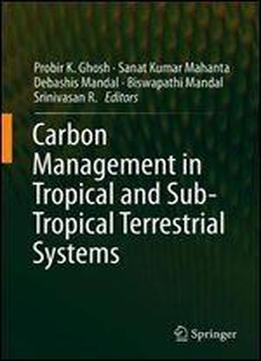
Carbon Management In Tropical And Sub-tropical Terrestrial Systems
by Probir K. Ghosh /
2019 / English / PDF
9.2 MB Download
Soil organic carbon (SOC), a key component of the global carbon (C) pool, plays an important role in C cycling, regulating climate, water supplies and biodiversity, and therefore in providing the ecosystem services that are essential to human well-being. Most agricultural soils in temperate regions have now lost as much as 60% of their SOC, and as much as 75% in tropical regions, due to conversion from natural ecosystems to agricultural uses and mainly due to continuous soil degradation. Sequestering C can help to offset C emissions from fossil fuel combustion and other C-emitting activities, while also enhancing soil quality and long-term agronomic productivity. However, developing effective policies for creating terrestrial C sinks is a serious challenge in tropical and subtropical soils, due to the high average annual temperatures in these regions. It can be accomplished by implementing improved land management practices that add substantial amounts of biomass to soil, cause minimal soil disturbance, conserve soil and water, improve soil structure, and enhance soil fauna activity. Continuous no-till crop production is arguably the best example. These soils need technically sound and economically feasible strategies to sustainably enhance their SOC pools. Hence, this book provides comprehensive information on SOC and its management in different land-use systems, with a focus on preserving soils and their ecosystem services. The only book of its kind, it offers a valuable asset for students, researchers, policymakers and other stakeholders involved in the sustainable development and management of natural resources at the global level.











